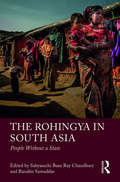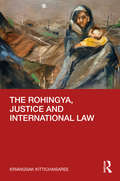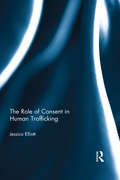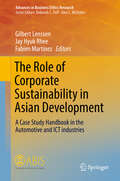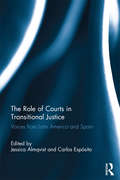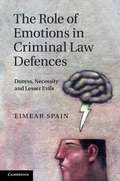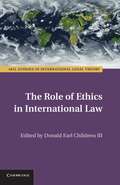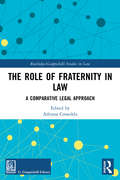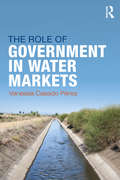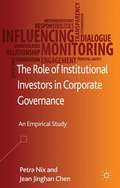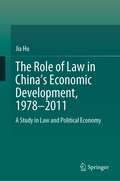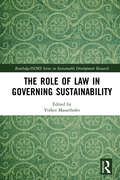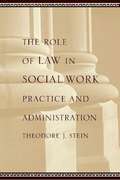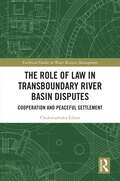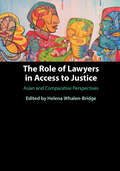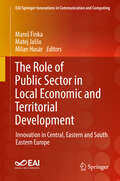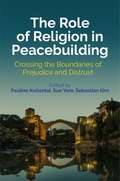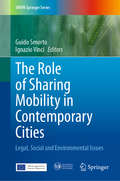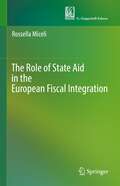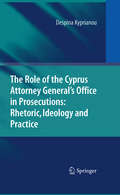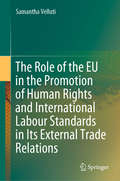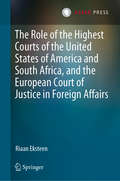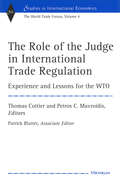- Table View
- List View
The Rohingya in South Asia: People Without a State
by Ranabir Samaddar Sabyasachi Basu Ray ChaudhuryThe Rohingya of Myanmar are one of the world’s most persecuted minority populations without citizenship. After the latest exodus from Myanmar in 2017, there are now more than half a million Rohingya in Bangladesh living in camps, often in conditions of abject poverty, malnutrition and without proper access to shelter or work permits. Some of them are now compelled to take to the seas in perilous journeys to the Southeast Asian countries in search of a better life. They are now asked to go back to Myanmar, but without any promise of citizenship or an end to discrimination. This book looks at the Rohingya in the South Asian region, primarily India and Bangladesh. It explores the broader picture of the historical and political dimensions of the Rohingya crisis, and examines subjects of statelessness, human rights and humanitarian protection of these victims of forced migration. Further, it chronicles the actual process of emergence of a stateless community – the transformation of a national group into a stateless existence without basic rights.
The Rohingya, Justice and International Law
by Kriangsak KittichaisareeWritten by an international judge, professor and former ambassador with decades of experience in the field, this is an incisive and highly readable book about international law as well as realpolitik in bilateral and multilateral diplomacy in the quest for justice by victims of serious human rights violations amounting to grave crimes of international concern. Focusing on the plight of the ethnic and religious group of persons called the ‘Rohingya’, normally residing in Myanmar, as the case study, the book elaborates the complex legal technicalities and impediments in international courts and foreign domestic criminal courts exercising ‘universal jurisdiction’ in relation to acts amounting to genocide, crimes against humanity and/or war crimes. It builds on and adds value to existing literature on the international law applicable to the protection of human rights as interpreted by the International Court of Justice as well as that on the international criminal justice meted out by domestic criminal courts, ad hoc international criminal tribunals and the permanent International Criminal Court. The book will be essential reading for students, researchers and academics in public international law, international criminal law, international human rights law as well as government officials and those working for NGOs and international organizations with mandates in these fields.
The Role of Business in the Responsibility to Protect
by John Forrer Conor SeyleThe Role of Business in the Responsibility to Protect closes the gap between research on the Responsibility to Protect and the private sector, as previous research has focused only on state responsibilities and state actors. This book examines in detail the developing research on the significant role that private sector actors can play in promoting peace and stability. Contributors to this volume explore the key arguments for where, why, and how private sector actors can contribute to the prevention and cessation of mass atrocity crimes; and how this can inform and extend the UN policy discussion around Responsibility to Protect. The contributors include lead voices in the Responsibility to Protect discourse as well as central voices in business and peace literature.
The Role of Consent in Human Trafficking
by Jessica ElliottHuman trafficking is consistently featured on the global political agenda. This book examines the trafficking of adult female victims for sexual exploitation, and specifically the understanding of consent and its influence in the identification and treatment of trafficking victims. Jessica Elliott argues that when applied to situations of human trafficking, migration and sexual exploitation, the notion of consent presents problems which current international laws are unable to address. Establishing the presence of 'coercion' and a lack of consent can be highly problematic, particularly in situations of human trafficking and exploitative prostitution; activities which may be deemed inherently coercive and problematically clandestine. By examining legal definitions of human trafficking in international instruments and their domestic implementation in different countries, the book explores victimhood in the context of exploitative migration, and argues that no clear line can be drawn between those who have been smuggled, trafficked, or 'consensually trafficked' into a situation of exploitation. The book will be great use and interest to students and researchers of migration law, transnational criminal law, and gender studies.
The Role of Corporate Sustainability in Asian Development: A Case Study Handbook in the Automotive and ICT Industries (Advances in Business Ethics Research #7)
by Gilbert Lenssen, Jay Hyuk Rhee and Fabien MartinezThis book examines the challenges faced by seven multinational companies - Intel, Lenovo, Samsung Electronics, ZTE, BMW Hyundai Motor Company, Mahindra and Mahindra - in their endeavour to contribute to the economic, environmental and social development of Asia. The lessons learned from the examination of these business practices may directly contribute to an increase in the practice of sustainable management and may as such contribute to positive economic, environmental and social impact of companies in this region. The cases are highly relevant for management theoreticians seeking to deepen our understanding of corporate sustainability in an area where scholars, practitioners and policy-makers can expect new questions, problems and challenges in the years ahead. The book is also of high interest to policy review agencies, policy makers and welfare economists seeking to support the development of a comprehensive sustainability framework for managing social and environmental issues in the context of Asia.
The Role of Courts in Transitional Justice: Voices from Latin America and Spain
by Jessica Almqvist Carlos EspósitoBringing together a group of outstanding judges, scholars and experts with first-hand experience in the field of transitional justice in Latin America and Spain, this book offers an insider’s perspective on the enhanced role of courts in prosecuting serious human rights violations and grave crimes, such as genocide and war crimes, committed in the context of a prior repressive regime or current conflict. The book also draws attention to the ways in which regional and international courts have come to contribute to the initiation of national judicial processes. All the contributions evince that the duty to investigate and prosecute grave crimes can no longer simply be brushed to the side in societies undergoing transitions. The Role of Courts in Transitional Justice is essential reading for practitioners, policy-makers and scholars engaged in the transitional justice processes or interested in judicial and legal perspectives on the role of courts, obstacles faced, and how they may be overcome. It is unique in its ambition to offer a comprehensive and systematic account of the Latin American and Spanish experience and in bringing the insights of renowned judges and experts in the field to the forefront of the discussion.
The Role of Domestic Courts in Treaty Enforcement: A Comparative Study
by David SlossThis book examines the application of treaties by domestic courts in twelve countries. The central question is whether domestic courts actually provide remedies to private parties who are harmed by a violation of their treaty-based rights. The analysis shows that domestic courts in eight of the twelve countries - Australia, Canada, Germany, India, the Netherlands, Poland, South Africa, and the United Kingdom - generally do enforce treaty-based rights on behalf of private parties. On the other hand, the evidence is mixed for the other four countries: China, Israel, Russia, and the United States. In China, Israel, and Russia, the trends are moving in the direction of greater judicial enforcement of treaties on behalf of private parties. The United States is the only country surveyed where the trend is moving in the opposite direction. U.S. courts' reluctance to enforce treaty-based rights undermines efforts to develop a more cooperative global order.
The Role of Emotions in Criminal Law Defences
by Eimear SpainThe law has struggled for many years with the problem of how to accommodate those who commit crimes due to threats or circumstances. The modern ambivalence surrounding the defences of duress and necessity has its origins in the legal past. To date the defences of duress and necessity have been couched in terms such as compulsion, involuntariness and human frailty, resulting in the true nature of the defences being hidden. Psychologists and legal theorists have begun to re-examine the role of emotions in human action, including their effect upon behaviour and choice. In light of recent breakthroughs, Eimear Spain considers how the emotions experienced by those who act due to threats, both human and natural in origin, should affect the attribution of criminal responsibility and punishment. The understanding of emotions extrapolated in this book points towards a new rationale for the existing defences of duress and necessity.
The Role of Ethics in International Law
by Donald Earl Childress IIIThe purpose of this book is to explore what role ethical discourse plays in public and private international law. The book seeks (1) to delineate the role of ethical investigation in creating, sustaining, challenging and changing international law and (2) to open up a conversation between two related disciplines - public and private international law - that frequently labor in different vineyards. By examining the role of ethical discourse in international law's public and private dimensions, this volume will hopefully open new avenues for cross-disciplinary exchange in these important fields and related disciplines. The chapters in this book show that there is a way to engage the ethical dimension of international law without seeking to use ethics as raw politics and the will to power.
The Role of Fraternity in Law: A Comparative Legal Approach (Routledge-Giappichelli Studies in Law)
by Adriana CossedduThis collection discusses the concept of fraternity and examines the issue of its role in law. Since the end of World War II, fraternity has been cited in several national constitutional charters, in addition to the United Nations Universal Declaration of Human Rights. But is there space for fraternity in law? The contributions to this book form an ideal “bridge” between the past and present to trace the different pathways taken to address the meaning of fraternity, and to identify its possible legal relevance. The book lays out paths that have placed fraternity in varied and challenging legal contexts in an age of globalization and conflict, where the multiplicity of national and supranational sources of law seems to show its inadequacy to govern complexity, and coexistence between diversities that appear irreconcilable. The purpose is not to recover fraternity as a forgotten principle, but to reimagine it today to address the aim and force of law within a plurality of cultures. The analysis considers a possible universal dimension that models unity within diversity, and aspires to serve as a prologue to a transition from research to dialogue between different legal systems and traditions. The book will be of interest to academics and researchers working in the areas of Comparative Law, Legal History and Legal Philosophy.
The Role of Government in Water Markets
by Vanessa Casado-PerezWhile water is an increasingly scarce resource, most existing methods to allocate it are neither economically nor environmentally efficient. In these circumstances, water markets offer developed countries a form of regulatory response capable of overcoming many of the shortcomings of current water management. The debate on water markets is, however, a polarized one. This is mostly a result of the misunderstanding of the roles played by governments in water markets. Proponents mistakenly portrayed them as leaving governments, for the most part, out of the picture. Opponents, in turn, understand commodification of water and administration by public agencies as incompatible. Casado Pérez argues that both sides of the debate overlook that water markets require a deeper and more varied governmental intervention than markets for other goods. Drawing on economic theories of regulation based on market failure, she explains the different roles governments should play to ensure a well-functioning water market, and concludes that only the visible hand of governments can ensure the success of water markets. Casado Pérez proves her case by examining case studies of California and Spain to assess the success of their water markets. She explores why water markets were more extensively institutionalized in California than in Spain in the first ten years since their introduction and how the role of governments in each case study impacted water market operation. This unique analysis of governmental roles in water markets, alongside qualitative studies of California and Spain, offers valuable guidance to understand environmental markets and to face the challenges presented by water management in regions with periodical droughts.
The Role of Institutional Investors in Corporate Governance
by Petra Nix Jean Jinghan ChenWhat role do independent institutional investors play in the corporate governance of listed German companies? The authors provide insight into an empirical and qualitative research study, exploring the importance of communication and the role, independence and expertise, responsibilities, influence and monitoring of institutional investors.
The Role of Law in China’s Economic Development, 1978–2011: A Study in Law and Political Economy
by Jia HuThis book concerns how China's legal institutions promoted its economic growth and demonstrates that the law has played different roles at various stages of China's economic transformation, a signal of legal paradigm shifts in reaction to the changing political and economic pursuits.By decomposing the role of law in the process, the author argues that while the Chinese economy was transforming from a planned economy to a market-oriented one, the law also made its adjustment as a response—the Chinese legal system was evolving from the one consisting of primarily substantive laws to the one filled with high-level formal laws by the end of the last century. The above observation of legal formalization is further consolidated by introducing the particularities of China's legal education in those years—a topic rarely dealt with yet of significance to comprehensively understand the Chinese legal system in practice. Overall, the present book argues against the modernization theory and determinism that would anticipate a similar developmental path globally and shows that the relationship between law and economic development is contingent. Therefrom, this study weighs in the law and development debate and breaks a perception of static law in the economy by rejecting the conventional perception of established legal institutions as a precondition of modernity.Hence, this book could appeal to legal scholars and sociologists interested in reevaluating western theories of free economy and its relationships to the law. In addition, scholars interested in research methodology would find the perspective of paradigm shifts in interpreting China's transformations a helpful analytical framework in research. Moreover, policymakers and legislators concerned about the characteristics of law for economic results would also find the book useful.
The Role of Law in Governing Sustainability (Routledge/ISDRS Series in Sustainable Development Research)
by Volker MauerhoferThis book explores how public and private actors can interrelate to achieve also by means of law a sustainable development which is beneficial for the environment, society and the economy. The Role of Law in Governing Sustainability assesses the structure, functions and perspectives of law in the wider governance frameworks of sustainable development. It provides latest and in-depth insights from each of the three dimensions of sustainable development and the relations among them. Latest political developments on global and regional level related to the environmental, social and the economic dimensions are provided as well as in-depth case studies. Thereby the book explores how international and national laws and governance can help us move towards a more sustainable future. This book will be of great interest to students and scholars of environmental law, global governance and sustainable development.
The Role of Law in Social Work Practice and Administration
by Theodore SteinThe strong nexus between law and social work is beyond dispute: the law informs day-to-day social work practice and administration, and social workers are employed by the courts. Moreover, they work collaboratively with attorneys in legal aid offices, public defenders'offices, and other law enforcement settings, interviewing clients, preparing reports for use in court, interpreting social science information, and providing consultation on how best to approach client problems. This book addresses the relationship between the professions of social work and law and helps social workers develop the knowledge necessary to practice in a legal environment. The author focuses on how the law affects the day-to-day practice of social work; the creation, administration, and operation of social service agencies; and the ways in which social workers and attorneys collaborate to serve the public.
The Role of Law in Transboundary River Basin Disputes: Cooperation and Peaceful Settlement (Earthscan Studies in Water Resource Management)
by Chukwuebuka EdumThis book examines the role legal rules play in the resolution of disputes in transboundary river basins. When states fail to resolve disputes over shared water resources, many cast such failures on inadequate or ineffective legal rules. With this view in mind, this book examines the role that legal rules do, and can, play in aiding the peaceful settlement of disputes and furthering cooperation between different parties. Building on the interactional theory of law, this book formulates three analytical frameworks: the effect of norm-generating processes, the effects of water-related agreements and/or arrangements in the basins, and the effect of international water. It uses these frameworks to assess the role of law in the processes of cooperation and peaceful settlement of disputes on transboundary river basin by drawing on four illustrative case studies: the Jordan River Basin, the Nile River Basin, the Mekong River Basin, and the Indus River Basin. In doing so, this book presents a unique perspective on the multi-functional role of legal rules in those processes. Tapping into the global discussion on water security and water-related conflicts, this book stimulates readers to explore broader or interdisciplinary perspectives for understanding water-related issues. This book will be of great interest to students and scholars interested in water resource management, water law, environmental politics, conflict resolution, and sustainable development more generally.
The Role of Lawyers in Access to Justice: Asian and Comparative Perspectives
by Helena Whalen-BridgeTo a disturbing degree, we are at the mercy of our time and place. While law may provide relief for some of life's troubles, that requires access to justice. Accessibility is the focus of this volume, which expands analysis of access to justice beyond the US and the UK to Asia and other comparative jurisdictions. Chapters characterise access to justice dynamics in these jurisdictions by addressing how access is understood, how it is achieved or not achieved, and how the jurisdiction should improve. The book addresses some issues seldom addressed in analyses of western jurisdictions, such as paid mandatory legal services and mandatory public interest activities, and provides English translations of relevant regulations. The book expands our understanding of access to justice with a comparative perspective, one that allows readers to identify relationships between access and its constitutive environment.
The Role of Public Sector in Local Economic and Territorial Development: Innovation in Central, Eastern and South Eastern Europe (EAI/Springer Innovations in Communication and Computing)
by Maroš Finka Matej Jaššo Milan HusárThe book covers the topic of the role of public sector in the economic and territorial development across several dimensions of spatial planning, e.g. theoretical-methodological (planning cultures, leadership), executive (regional policies, services of general interest), sectoral (energy, tourism, air-quality) or social (social innovation, preservation of cultural heritage). The book delivers up-to date knowledge build on interactions between representatives of different stakeholders of economic and territorial development with the research represented by renowned experts and academicians. This is mirrored in the content of the book, delivering in a consistent form the conceptual explanations combined with the examples of the role of the public sector in fostering the local economies within the frame of spatial planning. The book reflects and transfers the expert knowledge which has been generated during more than a decade of scientific and research activities of Spa-ce.net.Presents a comprehensive view on different aspects of the involvement of public sector in the local and regional spatial development;Includes a combination of macro-regionally specific perspectives with the generalized knowledge;Provides knowledge from various researchers from prestigious European scientific and research teams.
The Role of Religion in Peacebuilding: Crossing the Boundaries of Prejudice and Distrust
by Dan Cohn-Sherbok Pauline Kollontai Sue Yore Sebastian Kim Kjetil Fretheim Pan-Chui Lai Cosimo Zene Kevin P. Considine Revd Canon Dr Christopher Collingwood Daeseung Son Margaret R. Pfeil Sangduk Kim Jamal Khader Mary Grey David Emmanuel Singh Agustinus Sutiono Michael John Tilley Lasma Latsone Gboyega Michael Tokunbo Linden Bicket Jenifer M. BakerThe question 'who is my neighbour?' challenges the way we see ourselves as well as the way we see others. Especially in situations where we feel conflicted between our own self-identity and common identity within a wider society. Historically, religion has contributed to this inner conflict by creating 'us versus them' mentalities. Challenging this traditional view, this volume examines how religions and religious communities can use their resources, methodology and praxis to encourage peace-making. The book is divided into two parts - the first includes sources, theories and methodologies of crossing boundaries of prejudice and distrust from the perspectives of theology and religious studies. The second includes case studies of theory and practice to challenge prejudice and distrust in a conflict or post-conflict situation. The chapters are written by scholars, religious leaders and faith-motivated peace practitioners from various global contexts to create a diverse academic study of religious peace-building.
The Role of Sharing Mobility in Contemporary Cities: Legal, Social and Environmental Issues (UNIPA Springer Series)
by Guido Smorto Ignazio VinciThe emergence of sharing mobility is having a profound impact on urban landscapes. In fact, it is deeply affecting the traditional organization of local services by calling into question how urban transportation is planned, and by redesigning city spaces. Further, by connecting people to shared assets, services or both, sharing mobility is poised to facilitate the more efficient use of underutilized resources, becoming a powerful tool for economic growth and social inclusion, while also contributing to sustainability. That being said, the economic, social and spatial impacts of sharing mobility have not been sufficiently investigated, and so far, the evidence is mixed. From a normative standpoint, while it is relevant to better understand the relations between sharing mobility, the city and the environment, it is also of crucial importance to define new policies and sound rules for sharing mobility in urban areas. Against this backdrop, this book adopts a multidisciplinary perspective to explore the role that sharing mobility can play in the creation of more just and sustainable cities.
The Role of State Aid in the European Fiscal Integration
by Rossella MiceliThis book analyzes the issue of European fiscal State aid in order to provide insights into the related evolution prospects and legal problems. State aid has assumed a central position in the field of taxation, becoming the most important instrument of European legal integration, especially in the area of direct taxes. This is the result of major regulatory and interpretative development, which has altered the initial European and national balances in the face of globalization and the problems of the new economy. In this context, the scope and objectives of State aid have progressively broadened, encompassing a significant level of both positive and negative integration of European national tax systems.
The Role of the Cyprus Attorney General's Office in Prosecutions: Rhetoric, Ideology and Practice
by Despina KyprianouThis book is a fascinating and entirely original work about the role of the Cyprus Attorney General's Office in prosecutions. It is based on data gathered using an impressive blend of methods, including observation, a documentary survey and semi-structured interviews within the Office. The book focuses mainly on the workload of the Law Office and its relationship with the Police, the role it acquires during investigations and its role in the formulation and application of prosecution policies. These themes are approached from three different angles: the legal framework and the rhetoric developed over time concerning these areas, combined with the manner in which successive Attorney Generals have approached their role; the ideology that characterises the Law Officers' position towards these particular functions, and the actual day-to-day activity (practices) observed within the Law Office. Although the central purpose of this work is to provide a profound understanding of the Cyprus system, wider conclusions can be drawn which exceed the boundaries of the particular jurisdiction and shed light on the most debatable aspects of the prosecution process in all jurisdictions.
The Role of the EU in the Promotion of Human Rights and International Labour Standards in Its External Trade Relations
by Samantha VellutiThis book represents a significant and timely contribution to the copious literature of the EU as a global actor providing new insights and fresh perspectives into the promotion of human rights and international labour standards in the EU’s external trade relations, building on and stimulating further – the already well-engaged – scientific dialogue on this area of research. In particular, it provides the basis for developing a new analytical structure for better understanding the role of the EU in promoting human rights and international labour standards in global trade and, in particular, for assessing the extent to which and how normative considerations have influenced the adoption of EU legal instruments and policy decisions. This book will appeal to research scholars, post-graduate students, practitioners and human rights activists.
The Role of the Highest Courts of the United States of America and South Africa, and the European Court of Justice in Foreign Affairs
by Riaan EksteenThis book deals with what the author considers a sorely neglected question, namely the role of the judiciary in states’ foreign policy processes. Eksteen argues that the impact of the judiciary on foreign affairs is understudied and that recognition of its role in foreign affairs is now due. This makes it a ground-breaking scholarly contribution that should first of all prove of value to students, scholars, researchers and practitioners in the two broad fields of politics and law for the wide scope of issues it covers and the very comprehensive reference lists it contains. Secondly, professionals working within politics, including members of the legislatures of the United States, the European Union and South Africa, as well as members of the judiciaries there, should find this book of benefit.A detailed examination has been undertaken of the role of the United States Supreme Court, the two high courts in South Africa, namely the Constitutional Court and the Supreme Court of Appeal, and the European Court of Justice of the European Union, in foreign affairs. The author substantiates the unmistakable fact that these Courts have become involved in and influence foreign affairs. Furthermore, that they have not shied away from using their judicial authority when dealing with cases touching on foreign affairs and especially presidential overreach.The lack of recognition of the judiciary’s role in foreign affairs is still noticeable in Foreign Policy Analysis (FPA) literature. This book concludes that FPA has to accept and give proper recognition to the judiciary and its increasing relevance in foreign affairs.Dr. Riaan Eksteen is a Former South African Ambassador residing in Namibia; from 1968-1973 he served at the South African Embassy in Washington D.C.; between 1976-1994, he subsequently served as Ambassador and Head of Mission at the U.N. in New York (1976-81), in Namibia (1990-91), at the U.N. in Geneva (1992-94), and in Turkey, with accreditation also to Azerbaijan, Kyrgyzstan, Turkmenistan and Uzbekistan (1995-97). He obtained his Ph.D. from the University of Johannesburg in October 2018.
The Role of the Judge in International Trade Regulation: Experience and Lessons for the WTO
by Thomas Cottier Petros Constantinos Mavroidis Patrick BlatterThe WTO is generally seen as a key actor of globalization and, as such, has been the point of convergence of popular irritation worldwide. Many of the reproaches addressed to the WTO show civil societys concern with what is perceived as a democratic deficit in the way the organization operates. The main fear is to see trade rise as the ultimate value, prevailing over concerns such as health and environment. The Role of the Judge offers insight into how disputes are solved at the WTO level, into how the judicial branch interacts with the rest of the organization, and into the degree of sensitivity of the system to external input. The book sheds light on the judicial system governing the WTO and shows it to be the only truly multilateral system where disputes are solved by third-party adjudication. The book develops along three lines: the first a search for cases submitted to the WTO where the judge exceeded its authority; the second a comparison of the WTO with the operations of national judicial systems having different levels of integration, specifically the United States (federal level) and the EC (quasi-federal level); and the third an exploration of directions for the future of dispute settlement in the WTO. Reflecting the diversity of its contributors, this book addresses questions of economics, political science, and law, bringing an unusual level of multidisciplinarity to this topic and context. It is designed for both academic readers and practitioners, who will find it full of practical insights as well as rich and detailed analysis.
